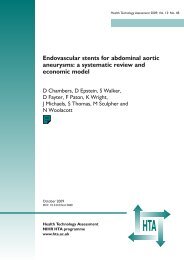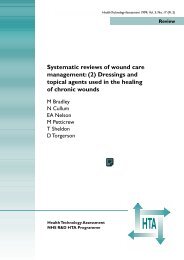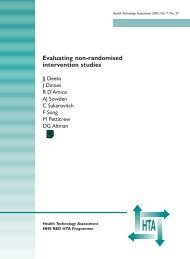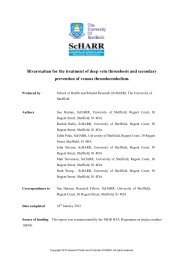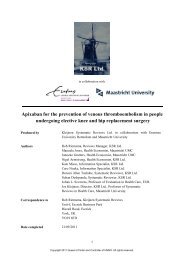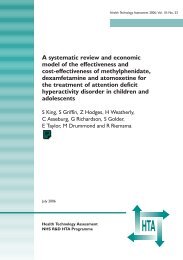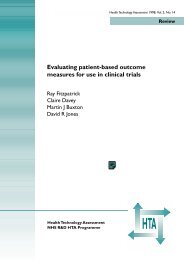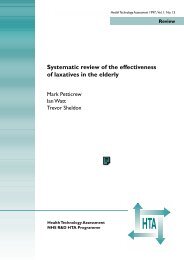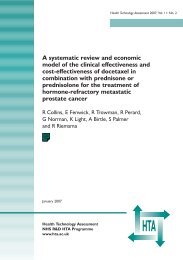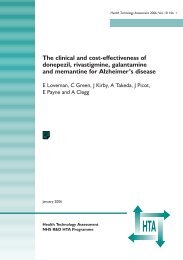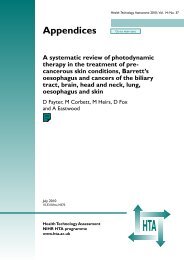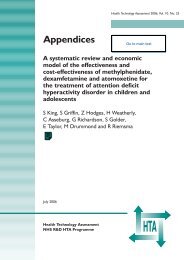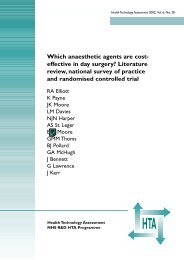How far does screening women for domestic (partner) - NIHR Health ...
How far does screening women for domestic (partner) - NIHR Health ...
How far does screening women for domestic (partner) - NIHR Health ...
You also want an ePaper? Increase the reach of your titles
YUMPU automatically turns print PDFs into web optimized ePapers that Google loves.
54<br />
Review Question IV<br />
developing a number of life skills. Women were<br />
recruited primarily through the victim witness<br />
programmes of two district attorney offices.<br />
Follow-up did not extend beyond the 12-week<br />
intervention. At the end of the intervention, selfefficacy<br />
scores improved <strong>for</strong> the <strong>women</strong> receiving<br />
group counselling, but declined slightly <strong>for</strong> <strong>women</strong><br />
in the control arm of the study. There was an<br />
improvement in <strong>women</strong>’s perception of abuse<br />
across time in both groups. There were no betweengroup<br />
comparisons, no scores <strong>for</strong> the outcome<br />
measures and no reporting of any statistical<br />
analysis.<br />
Variable results were obtained by Melendez and<br />
colleagues 156 in a randomised controlled trial of<br />
group counselling, in which abused and nonabused<br />
<strong>women</strong> recruited from a family planning<br />
clinic were offered four or eight group sessions of<br />
cognitive behavioural therapy to prevent human<br />
immunodeficiency virus (HIV)/sexually transmitted<br />
disease (STD) infection. (The data <strong>for</strong> the abused<br />
and non-abused <strong>women</strong> were reported separately<br />
and only those relating to the abused <strong>women</strong><br />
are given here.) Two measures were used to test<br />
safe-sex practices: condom use in general and<br />
episodes of unprotected sex. At 1 month and 12<br />
months of follow-up, abused <strong>women</strong> who received<br />
eight sessions of counselling were significantly<br />
more likely to say that they used condoms at<br />
least sometimes, compared with controls or with<br />
<strong>women</strong> receiving only four sessions of counselling.<br />
<strong>How</strong>ever, there was no difference between groups<br />
in the number of unprotected sex occasions.<br />
Short-term benefits were reported in the use of<br />
alternative safer-sex strategies in both intervention<br />
groups, and negotiation over safer sex after eight<br />
sessions of therapy, but these were not maintained<br />
at 12-months’ follow-up. There was no difference<br />
in abuse outcomes between the intervention and<br />
control groups at any postintervention assessment.<br />
A parallel group study by Rinfret-Raynor and<br />
Cantin in Canada evaluated feminist-in<strong>for</strong>med<br />
therapy <strong>for</strong> survivors referred to social services,<br />
either in individual or group sessions. 157 The<br />
intervention was compared with the normal nonstructured<br />
therapy provided to clients by the<br />
agencies. The therapies were administered in a<br />
number of settings, including community health<br />
centres. When followed up after 12 months, <strong>women</strong><br />
in all three arms of the study showed similar<br />
improvement over time in terms of abuse, selfesteem<br />
and assertiveness.<br />
Another group intervention was reported by<br />
Kim and Kim 158 in a parallel-group evaluation in<br />
Korea, conducted with <strong>women</strong> survivors of <strong>partner</strong><br />
violence residing long-term in a refuge. The<br />
intervention group <strong>women</strong> were given eight weekly<br />
sessions of counselling based on an empowerment<br />
crisis-intervention model that was problem focused<br />
and goal directed. Follow-up was restricted to an<br />
immediate postintervention assessment. Women<br />
who received counselling had significantly reduced<br />
levels of trait anxiety compared with <strong>women</strong> in the<br />
control group. There were no differences between<br />
groups <strong>for</strong> state anxiety and depression scores,<br />
which decreased in both. Self-esteem did not<br />
change between or within groups.<br />
A be<strong>for</strong>e-and-after evaluation conducted by<br />
<strong>How</strong>ard and colleagues 159 considered counselling<br />
delivered by 54 <strong>partner</strong> violence providers in<br />
Illinois, USA. These providers varied in terms<br />
of theoretical framework and delivery. Generic<br />
counselling significantly improved the well-being<br />
and coping of physically abused <strong>women</strong> who<br />
approached support services <strong>for</strong> help, and was of<br />
particular benefit to <strong>women</strong> who had been both<br />
physically and sexually assaulted as compared with<br />
<strong>women</strong> who had suffered physical assault on its<br />
own.<br />
In summary, there was a wide range of individual<br />
psychological interventions, which demonstrated<br />
improvements in psychological outcomes including<br />
depression, PTSD and self-esteem. Two fairly wellexecuted<br />
trials 125–129,145,146 of individual cognitive<br />
therapy-based interventions <strong>for</strong> <strong>women</strong> with PTSD<br />
who were no longer experiencing violence provide<br />
reasonable evidence <strong>for</strong> this intervention, but this<br />
cannot be extrapolated to the <strong>women</strong> who were still<br />
in an abusive relationship. Consideration of only<br />
the high-quality studies 142,143,145,146 <strong>for</strong> individual<br />
interventions did not alter the findings.<br />
Although there are 10 studies of group<br />
psychological interventions, all showing<br />
improvement in one or more psychological or<br />
mental health outcome, all but one are poorly<br />
executed. Consequently, the effectiveness of this<br />
type of intervention remains uncertain, particularly<br />
<strong>for</strong> <strong>women</strong> who are still experiencing <strong>partner</strong><br />
violence.



